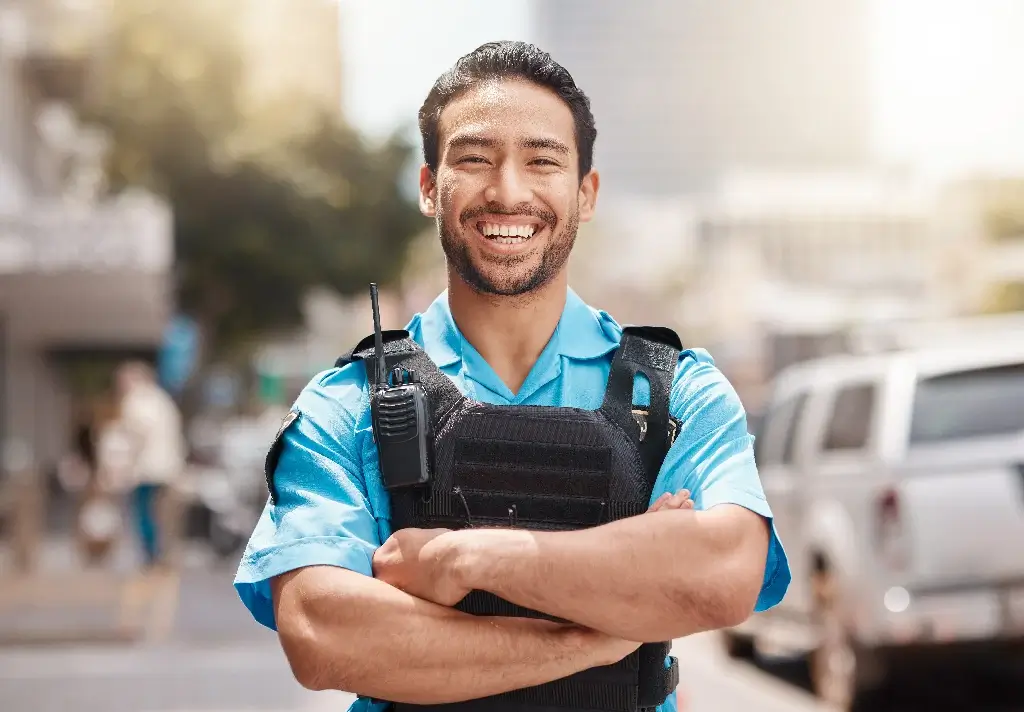Philadelphia Police Exam 2025: Prep Course & Free Practice Test
Our Philadelphia Police Prep course is expertly designed to align with the specific requirements of the Philadelphia Police Department’s recruitment process. It comprehensively addresses crucial components like cognitive skills, law enforcement situations, and personality evaluations, guaranteeing thorough preparation for every facet of the exam. By blending interactive practice tests with authentic scenarios, we empower you with the confidence and skills needed to excel in the examination.
Start your journey with us, and take a significant step towards a rewarding career in law enforcement.

Philadelphia Police Exam Course
Last Updated: Jan 24, 2025
Course Content
- 1IntroductionBuy this Course: Get full access to all lessons, practice tests and guides.
- 2VocabularyBuy this Course: Get full access to all lessons, practice tests and guides.
- 3Reading ComprehensionBuy this Course: Get full access to all lessons, practice tests and guides.
- 4Psychological EvaluationBuy this Course: Get full access to all lessons, practice tests and guides.
- 5Bonus - Background InvestigationBuy this Course: Get full access to all lessons, practice tests and guides.
- 6Bonus - Medical EvaluationBuy this Course: Get full access to all lessons, practice tests and guides.
- 7Bonus - Polygraph TestBuy this Course: Get full access to all lessons, practice tests and guides.
Nelson Denny Reading Test
The Nelson-Denny Reading Test marks the beginning of the Philadelphia police recruitment journey. This test is crucial as it evaluates a candidate’s reading abilities, which are vital for effectively performing job-related duties. These tasks often involve comprehending laws, regulations, reports, and other critical documents.
The test is divided into two main parts:
Vocabulary: You will be presented with a list of words and required to choose the synonym or antonym of each word from a set of options. This part evaluates your language proficiency, an essential skill in police work.
Elucidate means
- A:
Confuse
- B:
Illuminate
- C:
Ignore
- D:
Complicate
- E:
Argue
Explanation:
“Elucidate” means to clarify or explain something. Out of the given answer options, “Option B. Illuminate” most closely resembles this. It means to help clarify or explain.
Reading Comprehension: In this section, you will encounter a variety of passages, each accompanied by questions. These questions are designed to test your ability to comprehend, interpret, and deduce information from written scenarios.
Climate change is a complex environmental issue facing the planet. It refers to significant changes in global temperatures and weather patterns over time. Human activities, particularly the burning of fossil fuels and deforestation, have been identified as major contributors to this change. These activities increase the concentration of greenhouse gases in the atmosphere, leading to global warming and a host of associated effects.
The impacts of climate change are wide-ranging and global in nature. They include rising sea levels, more frequent and severe weather events like hurricanes and droughts, and disruptions to ecosystems and wildlife. In response, many countries are adopting measures to reduce greenhouse gas emissions, such as investing in renewable energy sources, implementing energy efficiency practices, and reforestation efforts.
One of the key challenges in addressing climate change is the need for international cooperation. Since climate change is a global issue, it requires a coordinated effort from all countries to mitigate its effects. This includes both industrialized nations, which are historically the largest emitters of greenhouse gases, and developing countries, which are more vulnerable to the impacts of climate change.
- A:
Economic recessions
- B:
Technological advancements
- C:
Frequent and severe weather events
- D:
Increased global cooperation
- E:
Reduction in wildlife populations
Explanation:
The passage mentions rising sea levels, and more frequent and severe weather events like hurricanes and droughts as impacts of climate change.
About the Philadelphia Police Exam
The Philadelphia Police Department’s pre-employment exam begins with a sequence of essential stages. It starts with the Nelson Denny Reading Test, followed by a Fitness and Agility Test. Subsequent steps include a comprehensive background check, a medical examination, and a psychological evaluation. Below is a detailed breakdown of all the steps involved:
1. Application Form: Candidates submit their application online during the designated enrollment period.
2. Notification and Orientation: Post-application, applicants are informed through email and postal mail, based on the details provided in their application.
3. Examinations:
- Reading Examination: Aspirants are required to clear the Nelson-Denny Reading Test, with a maximum allowance of two attempts.
- Physical Fitness & Agility Test: This follows the reading exam, where candidates have up to three tries to pass. It includes a series of physical activities like sit-ups, a 300-meter run, push-ups, and a 1.5-mile run.
4. Personal Data Questionnaire (PDQ) Interview: This involves filling out a thorough background questionnaire and submitting it to the Recruit/Background Investigations Unit. Accuracy and honesty are paramount; any discrepancies can lead to disqualification.
5. Background Investigation: This step scrutinizes a candidate’s moral and ethical values, involving interactions with employers, family, friends, and acquaintances. It aims to evaluate the candidate’s overall character and fitness for policing duties.
6. Medical Evaluation: A detailed physical examination is conducted, including various tests like EKG, vision tests, and drug screening. Candidates must pass this phase to advance.
7. Polygraph Examination: An extensive polygraph test is administered by certified professionals to ascertain the candidate’s honesty.
8. Psychological Evaluation: Involves taking the MMPI-2 test and undergoing an assessment with a licensed psychologist.
9. Chain of Command Approval: The candidate’s file undergoes a final review for either approval or rejection, which determines their job offer and placement in a Police Academy class.
10. Police Academy Training Program: Accepted candidates engage in 38 weeks of rigorous training at the Police Academy, which includes random drug testing.
11. On-The-Job Probation: Following training, candidates are promoted to Police Officer I and assigned to a patrol district for a one-year probation. Successful completion of this phase may lead to a permanent position with the Philadelphia Police Department.
Exam Dates & Timeline
If you’re aiming to join the Philadelphia Police Department, staying updated on the exam schedule and application deadlines is crucial. It’s essential to frequently visit the official website for the most recent information on job vacancies and key dates. This proactive approach will help you seize every opportunity to become a part of the police force.
Physical Fitness & Agility Test
This test is designed to ensure you, as a prospective police recruit, meet a minimum physical performance standard. This benchmark is set at the 15th percentile, tailored to your age and gender. The test is key in assessing your overall physical fitness and agility, which are essential for the demands of police work. Here’s what the Physical Agility Test includes:
1. Sit-ups: You will need to complete as many sit-ups as possible within one minute, testing your core strength and endurance.
2. 300-Meter Run: This sprint is to evaluate your speed and cardiovascular endurance.
3. Push-Ups: Like sit-ups, you’ll be challenged to perform as many push-ups as you can in one minute, assessing your upper body strength.
4. 1.5-Mile Run: This longer distance run gauges your stamina and endurance, crucial for enduring the physical demands of police duties.
You need to stay informed about the most recent physical fitness criteria set by the Municipal Police Officers’ Education and Training Commission. These guidelines undergo periodic revisions and are fundamental in helping you prepare effectively for the test.
Psychological Evaluation
In your journey to become a Philadelphia Police Officer, the psychological evaluation holds a pivotal role. This comprehensive assessment consists of two key elements: the administration of the MMPI-2 test and a subsequent evaluation session conducted by a licensed psychologist.
The MMPI-2, or Minnesota Multiphasic Personality Inventory-2, is a widely recognized and standardized psychometric test. It’s crafted to gauge various facets of your personality and psychological well-being. This helps in identifying any potential psychological factors that might influence your suitability for a law enforcement role.
After completing the MMPI-2 test, you will have a one-on-one evaluation with a licensed psychologist. This session delves deeper into your mental health, emotional strength, stress-coping abilities, and overall psychological readiness for the demands of police service. The information gathered during this assessment plays a vital role in evaluating whether you possess the mental resilience and temperament required to thrive in the demanding and frequently high-pressure law enforcement setting.
Course Format & Accessibility
Our Philadelphia Police Exam Course is meticulously crafted to meet the distinct format and demands of the Philadelphia Police Department’s examination. Led by expert instructors with profound expertise in the specific areas crucial for the Philadelphia exam, this course offers unparalleled advantages:
- Extensive Practice Questions: You’ll find an extensive bank of 60+ practice questions for each section of the Nelson Denny test. This ensures that you’re impeccably prepared across all relevant topics.
- MMPI-2 Mastery: We provide comprehensive insights into every trait assessed in the MMPI-2, along with practice questions to equip you for the examination.
- In-Depth Solutions and Explanations: Each topic is accompanied by in-depth sample questions featuring step-by-step solutions. These elucidate the logic and approach required for success.
- Dedicated Study Guides and Practice Tests: Each topic is supplemented with dedicated study guides and three practice tests, each containing a minimum of 10 questions. This empowers you to reinforce your learning and gauge your progress accurately.
- Customized Learning Paths: Tailor your study experience with customized learning paths that adapt to your knowledge level and learning speed, optimizing your preparation time.
- Flexible Learner Support: Get 24/7 access to support from our team of educators and tech support to ensure a smooth and uninterrupted learning experience.
*Note: Nelson Denny, Philadelphia Police, and other trademarks are the property of their respective trademark holders. None of the trademark holders are affiliated with PrepTerminal or this website.

Created by: Michael Learner
Psychometric Test Expert
73 students, 4.2, 11 Reviews
Hey, I’m Michael, PrepTerminal’s Law Enforcement expert. I am here to help you with any questions or concerns you may have about the Philadelphia Police Exam Course. Feel free to contact me at [email protected].

